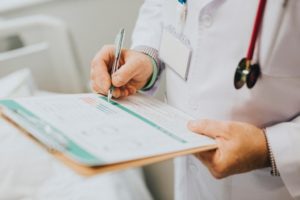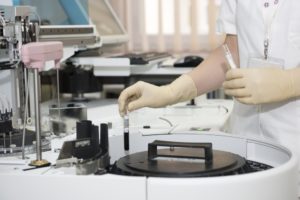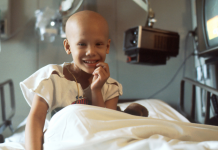This post is part of an editorial series, “Healthy Mama,” brought to you by the Fort Worth Moms Blog and Texas Health Care Privia Medical Group North Texas, which includes Dr. Elisabeth Wagner, Dr. Mickey Hooper, Dr. Bea Kutzler, Dr. Doug Decker, Dr. Jamie Erwin, Dr. Kathleen Cammack, Dr. Emily Maas, Dr. Jennifer McLeland, Dr. Lindsay Breedlove, Dr. Martha Guerra, Dr. Danielle Burkett, Dr. Robert Zwernemann, Dr. Jay Herd, Dr. Ingrid Kohlmorgen, and Dr. Martin Read. We hope these pieces provide you with helpful information, encouragement, and answers as you make decisions for your own health.

I’d always known my maternal grandmother passed away from breast cancer when my mother was young, but I didn’t assume it would affect me directly, at least not in my late-20s. Then, just last fall, my mother was diagnosed with breast cancer. In the last two months, she’s had two operations and is currently going through radiation.
At a postpartum appointment, I mentioned this to my midwife and she brought up genetic testing. Up until that point, I’d never really heard of genetic testing. I knew about test kits where people could find out more about their ancestries, but, given that my ancestry is a solid 100 percent Chinese, sending my genes off in the mail didn’t really peak my interest.
Genetic Testing and BRCA1/2
Genetic testing is a type of medical test that identifies mutations in chromosomes, genes, or proteins. The results can confirm or rule out a suspected genetic condition, or help determine a person’s risk of developing or passing on a genetic disorder.
BRCA1 and BRCA2 are the two most important and widely known genes for breast and ovarian cancer. When functioning properly, these genes actually produce tumor suppressor proteins that help repair damaged DNA. However, if mutated, this function is lost, resulting in an increased risk of breast and ovarian cancer.
Meeting with the Genetic Counselor
My midwife referred me to Moncrief Cancer Institute, where I was quickly set up with a genetic counselor. During our initial consultation, I was informed that inherited gene mutations that raise the risk of breast cancer are actually relatively rare (only about five to 10 percent) in the general population. However, since I presented with a strong family history of breast cancer, the possibility I inherited an abnormal gene linked to a risk of developing breast cancer was higher.
I was then given the option to undergo genetic testing. There were three different panels I could choose from. After talking it over with my husband, we decided to proceed with the most basic one, the BreastNext panel, which tests for 17 genes that have been linked to an increased lifetime risk for one or more cancers — such as breast, ovarian, and uterine cancer.
After getting my blood drawn, we waited for the results for about a month. The counselor called me just after Christmas with the good news: No known disease causing mutations were identified. I tested negative for 15 of the 17 genes. The remaining two genes were classified as being identified with variants of uncertain significance (VUS) — which means that, at this time, there is insufficient data to determine if this variant is associated with any increased cancer risk.
Benefits of BRCA1/2 Screening
 Breast cancer occurs in about one in eight women in their lifetime. If you test positive for certain known breast cancer gene mutations and have never had breast cancer, you and your healthcare provider can take steps to reduce your risk. In recent years, headlines have been made by people who’ve tested positive opting for preventative surgery.
Breast cancer occurs in about one in eight women in their lifetime. If you test positive for certain known breast cancer gene mutations and have never had breast cancer, you and your healthcare provider can take steps to reduce your risk. In recent years, headlines have been made by people who’ve tested positive opting for preventative surgery.
Alternative cancer screening plans may include scheduling annual mammograms or breast MRIs, starting at an earlier age. A less drastic measure may be making positive lifestyle changes, like exercising regularly and eating a diet that is low in processed foods and sugars.
Knowledge Is Power
After coming to terms with the fact that breast cancer may be hereditary in my family, I knew that I wanted to be empowered to make knowledgeable, proactive decisions concerning my health.
On the flip side, I also believe that too much knowledge can exert too much power over our mental and emotional stability. This was why I opted for the most basic screening. The results of these panels only identify the diseases you may be at a higher risk for. A negative test result doesn’t eliminate the chance of developing a non-hereditary breast cancer; you still have the same risk as that of the general population. And, although the panel can detect the majority of mutations, you could also have a gene mutation that the test wasn’t able to detect or that researchers haven’t yet identified.
While BRCA1/2 screening is publicly available, it is a very expensive test, and insurance will only extend coverage if you’ve been identified as high risk. If you find yourself with a similar family history of breast cancer, it may be beneficial to consider consulting a genetic counselor to go over your options for proactive, preventative management of your health.














